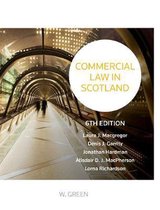Lecture 9 – Sale of Goods (Part 1) – Non-Consumer Contracts
Reading:
Davidson and Others, Commercial Law in Scotland (5th edn, 2018) p 1-9, 23-37 and 52-64
Terminology
For the purposes of sale of goods (and certain other contracts) there is now a clear distinction
in law between a consumer contract and a non-consumer contract.
A consumer contract is one between a party acting for purposes connected to their business
who supplies goods, digital content or services to a consumer, who is an individual acting for
purposes wholly or mainly outside their business (See Consumer Rights Act 2015, s 2).
A non-consumer contract is a contract in which both parties are acting for purposes
connected to their business.1
Mostly as a result of EU legislation, consumers receive substantially more protection than
non- consumers.
Therefore, in many situations it is essential to establish whether the contract is a consumer
contract or a non-consumer contract.
This handout focuses on non-consumer contracts for sale of goods.2
Non-consumer Contracts for Sale of Goods - Sources of law
The most important source is the Sale of Goods Act 1979. The common law applies except in
so far as inconsistent legislation (s.62 (2)).
Other legislation also applies. For example the Unfair Contract Terms Act 1977 (UCTA) and
the Electronic Commerce (EC Directive) Regulations 2002/2013.
Case law which interprets relevant legislation is also an important source.
The Sale of Goods Act 1979 (SoGA)
Introduction
SoGA is a consolidating Act. Many of its provisions were originally contained in the Sale of
Goods Act 1893. It has been amended several times since 1979. It is a UK wide statute but
not all sections apply in Scotland. There is an interpretation section (s 61).
SoGA applies to non-consumer contracts. Its provisions also apply to consumer contracts
unless expressly stated in the relevant section (in which case the section refers to the relevant
1
For completeness, a private contract is a contract in which both sides of the contract are acting
for purposes wholly or mainly not connected to their business.
2There are various types of contract for the supply of goods, for example: barter, hire and hire
purchase.
1
, section of the Consumer Rights Act 2015 (CRA)). Unless otherwise stated, the provisions
discussed below also apply to consumer contracts.
Definition:
Under s 2(1), “a contract of sale of goods is a contract by which the seller transfers or agrees
to transfer the property in goods for a money consideration, called the price.”
The seller may transfer the property, i.e. the ownership, in the goods as part of the contract
of sale.
However, the seller may agree to transfer property at some point in the future, or conclude
a contract subject to a condition. In both of the latter cases, the contract still falls within the
definition given above but is described as an agreement to sell.
In a conditional contract, the condition may be either suspensive or resolutive. Where the
condition is suspensive, performance of the obligation is delayed, or suspended, until the
condition is purified. By contrast, where the condition is resolutive, the obligation is already
in force, and purification of the condition brings the obligation to an end.
‘Goods’
Goods in Scotland include “all corporeal moveables except money”. It includes things
attached to or forming part of land which are agreed to be severed before sale or under the
contract of sale; and includes an undivided share in goods (s 61(1)).3
Under s 5 of the 1979 Act further subdivides goods into “existing” and “future” goods. Goods
may be existing (owned or possessed by the seller at the time of the sale) or future goods
(to be acquired or manufactured by the seller after the contract is made.) Future goods type
of contract can only be an agreement to sell. s. 5(3).
Hughes v Pendragon Sabre (t/a Porsche Centre Bolton)
In a recent case, the Court of Appeal found there to be a contract for the sale of goods when
a car dealer entered into a contract with a purchaser to sell him a limited edition Porsche if
the car dealer allocated one of the models by Porsche. The fact that the dealer did not have
the car at the time the contract was entered into, and that dealer’s acquisition of the goods
depended on the contingency of receiving the car from Porsche, did not prevent a contract
for the sale of the car being formed.
Goods may also be specific (identified and agreed at the time that the contract is made (s
61(1)) or unascertained (not identified and agreed upon at the time the contract is made).
3 Under the CRA the definition is intended to be more user friendly: “Goods” means any tangible
moveable items, but that includes water, gas and electricity if and only if they are put up for supply in a
limited volume or set quantity (CRA, s 1).
2





